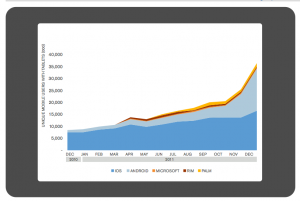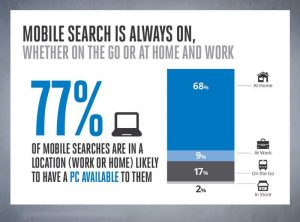In today’s technology driven world people want information on the go. This has instigated a change in the way people search and shop on the Internet. So many businesses forget to stay ahead of the constantly changing mobile market and fail to consider (at their detriment) how it can be harnessed to their advantage.
Why optimise for mobile?
- Between 83-93% of people (depending on country) use their mobile devices for web access every day.
- 35% of smartphone users make purchases on their mobile.
- 96% of users research products and services on their smartphone.
- 59% of mobile searchers will visit a store after searching for it online on their mobile.
Despite all this, a large proportion of webmasters do not offer mobile-optimised content to their customers.
Mobile Site Optimisation
The key to mobile optimisation is to get it right at the build stage. SEO for your desktop site should positively impact on your mobile site without any specialist ‘mobile SEO’ being required. This does however very much depend on how your website has been built.
Time and time again we come across brands that have made fundamental errors in their mobile site set up which negatively affects their overall search engine rankings. We see mobile sites created as sub folders and pages hidden from the search engine spiders using robot.txt files – these workarounds can create numerous problems for your SEO and will prevent your link building activity and mobile social shares from positively impacting on your overall website SEO.
The Rise of Tablets
With the increase of tablet usage you also need to ask yourself which version of your site is best presented to such devices – would you want a tablet user seeing shortened mobile content? A site designed with different devices in mind will be most successful.

If you are planning a new site, you should invest in a responsive style sheet that can accommodate all the different traffic you will receive and cater to your visitors’ individual needs, serving content dynamically.
Mobile Search
Generally there are no differences in the types of things people search for using a desktop PC or a smartphone device but there are key differences in the keywords and behaviour of mobile searchers which businesses need to consider when optimising their sites for mobile. For example 1 in 3 mobile searches have local intent.
Mobile searches tend to involve a maximum of three keywords and the searcher often has a good idea of what it is they want to find – they are often further along in the buying process than desktop searchers. A mobile searcher may be looking to find price information, or may want to find out where they can buy the product or service they want locally.

Evidence suggests also that smartphone searchers favour the top few results more than desktop searchers. Therefore being in the top organic positions on search engines like Google is more important than ever if your product or service is the type of thing people are likely to search for on their mobile device.
Usability is Key
Mobile screens are small and smartphone searchers find nothing more frustrating than sites that are not mobile-friendly. The mobile internet experience if poor can alienate potential customers.
A mobile optimised site is instantly recognisable; it has big buttons, less text and is quick to load. Is your site offering the optimal experience for your customers? We optimise to the ‘rule of thumb’ theory – every aspect of your website needs to be accessible for your finger – small buttons, links and any amount of content that requires lots of scrolling is non-optimal. Forms should be exceptionally short and information should be readily available in the fewest number of clicks possible.






































